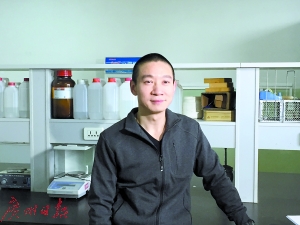In the field of science, the principle of “presumption of guilt†is to be pursued. Of course, this is only for the results of scientific research, not for scientists, especially before the results of academic misconduct can not be “guilty presumed†by researchers.

Han Chunyu
Han Chunyu’s words – “Why should I prove my innocence and self-inflicted?†caused serious consequences. Not only did 13 Chinese scientists make a real name, they asked to initiate an academic investigation of Han Chunyu, and they also reflected our eating. The misunderstanding of science by the people of the melons, their professionals and leaders. However, this is also a good thing. This can help and promote everyone to understand science and treat science in a way that is close to the correct way of opening, thereby improving the scientific literacy of the entire nation.
Until now, Han Chunyu still responded to the fact that 13 scientists were unable to repeat the results of NgAgo's effective editing of genes, and they still believe that others can't repeat, and the possibility of cell contamination is the greatest. This shows that Han Chunyu does not think that there is a problem with his own experiments, but that there are problems with other people's experiments. Because of this, it is even more necessary to question this research in order to understand the science in depth.
A study and discovery is not only "self-incrimination", but also "he proves innocence", which is the natural and natural nature of scientific research. However, quite a number of people believe that the legal principles of presumption of innocence should be applied to the results of the study and the researchers involved. It is reflected in the words of those who support Han Chunyu. The result is not repeated and it cannot be said that Han Chunyu is fraudulent.
I agree with this statement, but the result is not a falsification, but it may be that the result is incorrect. Whether the error is caused by an experimental error, an observation error, or a calculation error, the premise is unintentional, not intentional. As long as there is a mistake and no explanation, it is not science, but non-science, because science is falsifiable. Therefore, the principle of presumption of innocence applies only to life and not to scientific research.
On the contrary, in the field of science, the principle of “presumption of guilt†should be pursued. Of course, this is only for the results of scientific research, not for scientists, especially before the results of academic misconduct can not be “guilty presumptionâ€. The “presumption of guilt†of scientific research results is similar to the “original sin theory†of Christianity.
The Bible states that people have two kinds of sins—original sin and this sin. The original sin is the sinful and evil root left by the ancestor's sin. This sin is the sin committed by each person in this life. However, this is only a surface explanation. The meaning of "sin" in Hebrew is "not in the middle", that is, the archery is not in the target. Therefore, "original sin" means that a person violates God's will, fails to meet the goals that God requires, or lives according to God's requirements.
From a rational point of view, the meaning of “not in the middle†is very suitable for scientific research. The result of each scientific research is an arrow. Does this arrow hit the bull's eye – revealing the nature of things or the original face is questionable That is to say, after each research result comes out, it needs repeated self-certification and other evidence. If it can obtain repetitive verification, it can be considered that this arrow hits the target.
Karl Popper puts forward a rational way of understanding science in his "Conjecture and Refutation: The Growth of Scientific Knowledge", that is, first of all, that all scientific research results have "original sin", then suspicion and falsification, the term can be Expressed with a clearer concept, that is, confirmed. As the editorial department of Nature-Biotechnology has explained to some people's doubts about Han Chunyu's research: "Published papers must be able to be repeated by others in accordance with the technical details mentioned in the article."
Any research findings and knowledge are hypothetical at the outset and require repeated falsification (validation). At the same time, the spirit of science is criticism, that is, constantly overthrowing old theories and making new discoveries. Moreover, new discoveries and hypotheses will continue to be questioned and criticized until they are falsified or confirmed.
Only verifiable research results can be called scientific conclusions, and science is the theory that can be verified. To be precise, the doctrines that are left after the erroneous theory is ruled out constitute the content of science. Conversely, if a research result is not testable, it is non-scientific. However, even those that are excluded are scientific in nature, because they are falsified to allow later scientific research to find the right direction.
The growth of scientific knowledge is carried out in this way. Therefore, Popper said, "We can learn from our mistakes."
Dried Garlic Flakes,Fried Garlic Flakes,Slice Of Garlic,Roasted Garlic Slices
shandong changrong international trade co.,ltd. , https://www.cragriculture.com